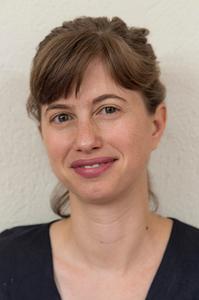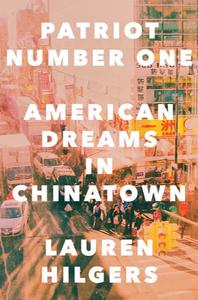
|
|
| photo: Erich Hehn | |
Lauren Hilgers lived in Shanghai for six years, writing about political scandals in Beijing and tomb raiders in Henan Province. Her work has appeared in Harper's, Wired, Businessweek, the New Yorker and the New York Times Magazine. Patriot Number One: American Dreams in Chinatown (Crown, $27; reviewed below) is the intimate portrait of a husband and wife who travel from a rural Chinese village to New York City in search of new beginnings but find the pursuit of the American Dream more difficult than they could have imagined.
What piqued your interest in studying about Chinese immigrants and Chinatowns in the U.S.?
I came to New York in 2012, after having spent six years living in Shanghai. At the time, I wasn't convinced that I wanted to leave China. I loved Shanghai, we had built a community there. Our neighbors knew us, the woman who ran the corner shop knew us, and our status as outsiders (albeit privileged ones) made curiosity and discomfort an imperative of daily life. I think I went looking for that when I moved to Brooklyn. It didn't take long before I realized that our local laundry, dollar store and fish market were all run by Chinese immigrants from Fujian Province. By virtue of those acquaintances, I knew something about Chinese immigration to the United States by the time I met Zhuang and his wife, Little Yan.
That said, I had barely scratched the surface. I understood that immigrants from China had impacted our neighborhood, that vans were transporting employees back and forth daily, and that the people working in Brooklyn talked about family and friends in Queens, Florida, Texas and California. It wasn't until meeting Zhuang that I started to understand the scope and intricacy of these connections. And it wasn't until I started exploring Flushing that I began to form a picture of what it really took to build a life in the United States.
How did you meet Zhuang Liehong and Little Yan? What was it about his story that made you want to help him as he sought asylum in the United States?
I met Zhuang in the tea shop he had opened in Wukan. I had been sent there on a magazine assignment, intending to write about the aftermath of a weeks-long protest that had swept through the village in 2011. I wasn't planning on writing about Zhuang, but knew he had played a role in what had happened. Then on my second trip to the village, I walked by Zhuang's tea shop (he was blasting Michael Jackson out of an open doorway) and he invited me in. I ended up making four more trips to the village before Zhuang fled, and stopped at his shop each time. On one of those trips he invited me to his home for dinner, where I met Little Yan and their newborn baby, Kaizhi. Zhuang was one of a handful of villagers I was visiting--I didn’t consider myself any closer to Zhuang than anyone else. When he showed up on my doorstep in Brooklyn, I was shocked. But I did know his back story. I knew what had been happening in Wukan. I knew that he needed help. He asked, and I didn't have it in me to turn him away.
How did you respond when Zhuang and Little Yan showed up, relying on your connections to navigate the city?
It was inevitable, once I decided to let Zhuang and Little Yan stay in our apartment, that I would end up helping them get around the city. There was really no way they could find their way to Flushing from Brooklyn on their own. And, on top of all this, I was curious. I wanted to see what their options were. He gave me an excuse, for example, to walk into a room someone was trying to rent out, see what it looked like and watch the negotiation process. While I stuck out, my connection with Zhuang and Little Yan made it acceptable that I was there. We were all feeling out the neighborhood together. What makes Flushing such a mecca for immigrants?
What makes Flushing such a mecca for immigrants?
The 7 [subway] train, in particular, has had a big influence on how the neighborhood has developed. The real estate is relatively affordable and the train provides access to Manhattan. There is also infrastructure. There are Chinese grocery stores, restaurants, doctors, schools, employment agencies and a system of vans that connect the neighborhood to Manhattan's Chinatown and to Sunset Park in Brooklyn. This infrastructure was largely the result of one savvy real estate investor named Tommy Huang. Huang invested in the neighborhood in the 1980s, putting money into the buildings along Flushing's Main Street, working to attract Taiwanese immigrants, and constructing a total of seven high rises over a period of six years. In those six years, Flushing was on its way to becoming a central shopping district for Chinese immigrants. Today, the neighborhood is a natural landing spot for working-class immigrants, particularly for those who speak Mandarin, rather than Fujianese or Cantonese.
What fuels Zhuang's and fellow exile Tang Yuanjun's involvement with the dissidents, despite the fact that such actions could spark reprisals or retaliations against family members in China?
This is a difficult question to answer. Zhuang's idealism is deeply ingrained. He started out as an activist with a sense that he was embarking on an adventure, that he was the swashbuckling swordsman working to save his village. That original optimism has grown into something more serious and dogged. Zhuang wants to be a good person. He believes in right and wrong. And he hates being bullied. I have heard him tie some of these personality traits to events in his childhood, but feel sure that many people with similar backgrounds would not be as resolute as Zhuang has been.
Tang has likewise held onto his convictions, and his dedication to democracy, over decades and through extremely difficult circumstances. I do think it helps that neither has been called upon to continue their activism in isolation. They are surrounded by friends and supporters in Flushing who share their ideals. It doesn't change the fact that they are unable to return home, or prevent the helplessness they feel when their family members are sick or in danger. But they can, at the very least, tell their stories to people who understand.
Zhuang, Little Yan and Karen, Little Yan's ESL classmate, struggled in their initial years in Flushing because of culture shock and because reality did not match expectations. Saving face discouraged them from communicating the realities to families back in China.
It's true that many of the immigrants I know in Flushing offer a rose-tinted version of their lives to their friends and families back home. These stories, and the money that gets sent back home, certainly feed into an ideal of immigrant life in America. Karen's mother, for example, had heard stories from relatives and friends and believed that success in the United States would come easily for her daughter.
What advice would you impart to immigrants to help them prepare for life abroad?
More transparency, and more practical advice, might have helped someone like Karen adjust her expectations. I'm not sure I know words capable of preparing someone for the experience of uprooting themselves from their homes and landing in an unfamiliar, often unfriendly, place. People who made an effort not to gloss over reality--the long hours working, the dirty streets, the feeling of isolation--found that their friends back home did not believe them. It is hard to understand a particular feeling of pain if you are not experiencing it.
Zhuang always prided himself on his media savvy with journalists in giving voice to Wukan villagers. What does he think of your book?
I feel extremely fortunate that Zhuang has been so open to this project. He understands that while much of the book is his story, it includes other voices and, ultimately, is told through my own lens. I am hopeful that someday the book will be translated into Mandarin and Zhuang will have the opportunity to read it himself. --Nancy Powell, reviewer

